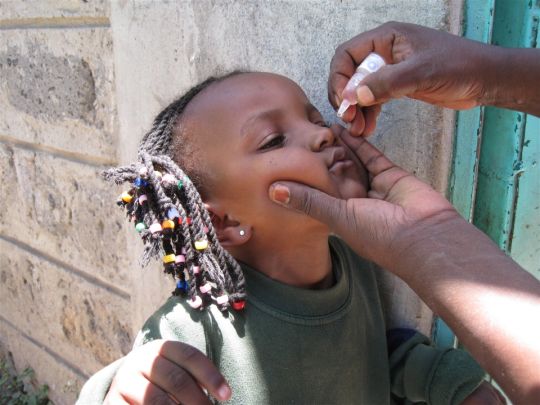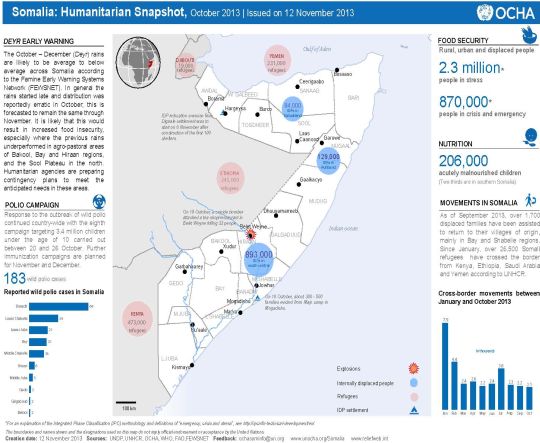Polio drive to target millions in Horn
Polio drive to target millions in Horn
KISUMU, 18 November 2013 (IRIN) – Efforts to stop the spread of polio in the Horn of Africa region are being ramped up with major immunization campaigns underway, targeting millions of vulnerable children.
 Polio mainly affects children under five years of age/ Photo: Jane Some/IRIN
Polio mainly affects children under five years of age/ Photo: Jane Some/IRIN
There have been outbreaks in Kenya and Ethiopia, and more seriously neighbouring Somalia, with 183 cases confirmed this year up to October, according to a snapshot by the UN Office for the Coordination of Humanitarian Affairs (OCHA).
 Humanitarian Snapshot,October 2013
Humanitarian Snapshot,October 2013
This is the first outbreak in Somalia since 2007. In response, 3.4 million children under the age of 10 were targeted for vaccination between 20 and 26 October. “Further immunization campaigns are planned for November and December,” the snapshot said.
If the polio outbreak in Somalia is not controlled quickly, global efforts to wipe out the disease once and for all could be jeopardized, warned the UN Children’s Fund.
So far this year (up to 13 November), some 334 polio cases have been recorded globally, compared to 187 over the same period in 2012, according to the Global Polio Eradication Initiative (GPEI). In 2012, a total of 223 cases were recorded worldwide.
In South Sudan, vaccination campaigns targeting those younger than 15 were carried out from 22-24 October, according to GPEI.
“Since polio outbreaks were confirmed in Somalia and other neighbouring countries of Kenya and Ethiopia, health authorities in South Sudan have been on high alert for any possible cases in the country,” said OCHA in a humanitarian bulletin. “South Sudan has been polio-free since June 2009.”
Immunizations campaigns are also planned in Ethiopia and Sudan.
Concern over South Kordofan, Blue Nile
A lack of humanitarian access is, however, hindering the exercise in Sudan’s South Kordofan and Blue Nile states. In October, the UN Security Council expressed concern about the imminent threat of the spread of polio in South Kordofan and urged the government of Sudan and the rebel Sudan People’s Liberation Movement-North (SPLM-N) to resolve their differences to enable a two-week polio vaccination campaign to take place in November.
“We are, on the UN side ready, if we get the green light,” OCHA’s director of the operation division, John Ging, told a press conference on 11 November.
“Sadly, and typically, since the Council passed its resolution calling for unfettered humanitarian access, once again we don’t have any access at all,” Ging said.
“We found 18 months ago when they passed the resolution that it did create momentum, but unfortunately we have been filibustered with process, discussions and disputes which have amounted to no access to humanitarian agencies.”
Security fears on Kenya-Somalia border
In Kenya, where 14 polio cases have been recorded, lapses in security along the border with Somalia are said to be partly to blame for the disease’s spread.
“Whenever there is a security lapse, health workers do not go to the villages for fear of attacks. This subsequently hinders reaching a huge chunk of children during the routine immunization exercise.”
“As long as increasing numbers of criminal gangs like Al-Shabab are still a threat, the war against polio will not be won,” said Ian Njeru, head of the division of disease surveillance and response in the Health Ministry.
“Whenever there is [a] security lapse, health workers do not go to the villages for fear of attacks. This subsequently hinders reaching a huge chunk of children during [the] routine immunization exercise.”
Njeru urged the Kenyan government to enhance border surveillance, noting that Somali asylum seekers, crossing into the country via unofficial crossing points, complicate efforts to fight polio.
Of the 14 cases, 10 have been reported in the Dadaab refugee complex, which hosts close to 400,000 mainly Somali refugees in eastern Kenya.
Njeru urged parents to take their children to hospitals for routine vaccination. “We are also planning for more intensive outreaches targeting pastoralist communities to ensure that we vaccinate them wherever they move to in search of pasture.”
Kenya’s Health Ministry plans to immunize some eight million children under the age of five in 2013 and has already reached 5.5 million in five previous campaigns. The next vaccination exercise will run from 16-20 November.
By ho/aw/cb
IRIN
###
About the United Nations Office for the Coordination of Humanitarian Affairs (OCHA)
OCHA is the part of the United Nations Secretariat responsible for bringing together humanitarian actors to ensure a coherent response to emergencies. OCHA also ensures there is a framework within which each actor can contribute to the overall response effort.
OCHA’s mission is to:
- Mobilize and coordinate effective and principled humanitarian action in partnership with national and international actors in order to alleviate human suffering in disasters and emergencies.
- Advocate the rights of people in need.
- Promote preparedness and prevention.
- Facilitate sustainable solutions.
How we deliver
OCHA’s Strategic Framework ensures that OCHA delivers on its core mandate, while responding to contemporary global challenges. The three pillars of the Strategic Framework are:
1. Partnerships: broadening the coalition for multilateral humanitarian action
The scale and scope of global challenges requires working together in new ways, with new partners. Partnership has always been integral to OCHA’s efforts. Sustained relations, built on trust and mutual respect, are vital when preparing for and responding to humanitarian emergencies. OCHA has a unique position within the international humanitarian system to convene and influence agendas. We will do this more strategically, with the aim of creating a more enabling environment for humanitarian action.
2. Service provider: building a better system
The expectations of OCHA have evolved since humanitarian reform. We will ensure that our services and support to partners also evolve and meet clients’ needs. We are focused on helping partners more predictably through humanitarian coordination leadership, strengthening coordination mechanisms, and improving the evidence base for humanitarian decision-making, planning and resource allocation.
3. Reliability and professionalism: creating better staffing and surge solutions to be there when it counts
In 2010, OCHA will introduce surge solutions to ensure the right people are on the ground immediately after a new disaster. This will be coordinated with longer-term staffing to ensure continuity of OCHA presence.
OCHA people
OCHA is its people. From 35 offices around the world, some 1,900 specialized and dedicated OCHA staff work to ensure that effective assistance reaches millions of humanitarian beneficiaries in four continents.

###
> United Nations (UN).
 The United Nations was established on 24 October 1945 by 51 countries committed to preserving peace through international cooperation and collective security. Today, nearly every nation in the world belongs to the UN: membership totals 192 countries.
The United Nations was established on 24 October 1945 by 51 countries committed to preserving peace through international cooperation and collective security. Today, nearly every nation in the world belongs to the UN: membership totals 192 countries.
When States become Members of the United Nations, they agree to accept the obligations of the UN Charter, an international treaty that sets out basic principles of international relations. According to the Charter, the UN has four purposes:
- to maintain international peace and security;
- to develop friendly relations among nations;
- to cooperate in solving international problems and in promoting respect for human rights;
- and to be a centre for harmonizing the actions of nations.
###
* The above story is adapted from materials provided by United Nations (UN)
** More information at United Nations (UN)




















